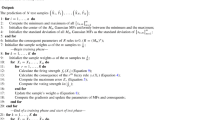Abstract
This paper proposes a new learning algorithm and a parallel model for fuzzy reasoning systems. The proposed learning algorithm, which is based on an ensemble learning algorithm AdaBoost, sequentially trains a series of weak learners, each of which is a fuzzy reasoning system. In the algorithm, each weak learner is trained with the learning data set that contains more data misclassified by the previous weak one than the others. The output of the ensemble system is a majority vote weighted by weak learner accuracy. Further, the parallel model is proposed in order to enhance the ensemble effect. The model is made up of more than one ensemble system, each of which consists of weak learners. In order to show the effectiveness of the proposed methods, numerical simulations are performed. The simulation result shows that the proposed parallel model with fuzzy reasoning systems constructed by AdaBoost is superior in terms of accuracy among all the methods.
Preview
Unable to display preview. Download preview PDF.
Similar content being viewed by others
References
Nomura, H., Hayashi, I., Wakami, N.: A Self-Tuning Method of Fuzzy Reasoning by Delta Rule and Its Application to a Moving Obstacle Avoidance. Journal of Japan Society for Fuzzy Theory & Systems 4, 379–388 (1992)
Mendel, J.M.: Fuzzy Logic Systems for Engineering: A Tutorial. Proceedings of the IEEE 83, 345–377 (1995)
Lin, C., Lee, C.: Neural Fuzzy Systems. Prentice Hall, PTR (1996)
Gupta, M.M., Jin, L., Homma, N.: Static and Dynamic Neural Networks. IEEE Press, Los Alamitos (2003)
Araki, S., Nomura, H., Hayashi, I., Wakami, N.: A Fuzzy Modeling with Iterative Generation Mechanism of Fuzzy Inference Rules. Journal of Japan Society for Fuzzy Theory & Systems 4, 722–732 (1992)
Fukumoto, S., Miyajima, H., Kishida, K., Nagasawa, Y.: A Destructive Learning Method of Fuzzy Inference Rules. In: IEEE International Conference on Fuzzy Systems, pp. 687–694 (1995)
Nomura, H., Hayashi, I., Wakami, N.: A Self Tuning Method of Fuzzy Reasoning by Genetic Algorithm. In: International Fuzzy Systems and Intelligent Control Conference, pp. 236–245 (1992)
Wang, L.X., Mendel, J.M.: Fuzzy Basis Functions, Universal Approximation, and Orthogonal Least Square Learning. IEEE Trans. Neural Networks 3, 807–814 (1992)
Kishida, K., Miyajima, H.: A Learning Method of Fuzzy Inference Rules using Vector Quantization. In: International Conference on Artificial Neural Networks, vol. 2, pp. 827–832 (1998)
Fukumoto, S., Miyajima, H.: Learning Algorithms with Regularization Criteria for Fuzzy Reasoning Model. Journal of Innovative Computing, Information and Control 1, 249–263 (2006)
Miyoshi, S., Hara, K., Okada, M.: Analysis of Ensemble Learning using Simple Perceptrons Based on Online Learning Theory. Physical Review E 71, 1–11 (2005)
Miyajima, H., Shigei, N., Fukumoto, S., Nakatsu, N.: A Learning Algorithm with Boosting for Fuzzy Reasoning Model. In: International Conference on Fuzzy Systems and Knowledge Discovery, vol. 2, pp. 85–90 (2007)
Schapire, R.E.: A Brief Introduction to Boosting. In: 16th International Joint Conference on Artificial Intelligence, pp. 1401–1406 (1999)
Author information
Authors and Affiliations
Editor information
Editors and Affiliations
Rights and permissions
Copyright information
© 2008 Springer-Verlag Berlin Heidelberg
About this paper
Cite this paper
Miyajima, H., Shigei, N., Fukumoto, S., Miike, T. (2008). Parallel Fuzzy Reasoning Models with Ensemble Learning. In: Sun, F., Zhang, J., Tan, Y., Cao, J., Yu, W. (eds) Advances in Neural Networks - ISNN 2008. ISNN 2008. Lecture Notes in Computer Science, vol 5263. Springer, Berlin, Heidelberg. https://doi.org/10.1007/978-3-540-87732-5_58
Download citation
DOI: https://doi.org/10.1007/978-3-540-87732-5_58
Publisher Name: Springer, Berlin, Heidelberg
Print ISBN: 978-3-540-87731-8
Online ISBN: 978-3-540-87732-5
eBook Packages: Computer ScienceComputer Science (R0)




